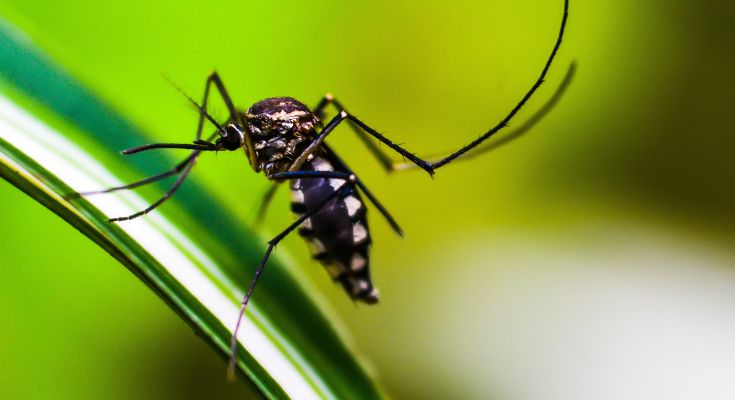If there’s one thing that makes a garden much less fun to be in, it is the presence of a mosquito: or more accurately, many annoying mosquitoes. These little bugs are a nuisance and even a danger to humans at times, and having to spray mosquito repellent all over yourself is an unpleasant experience in its own right. But believe it or not, you could walk around your garden, indoors or outdoors, without artificial repellent.
There are actually natural ways to go about this: plants that keep mosquitoes away, and even flowers that repel mosquitoes. With the use of these natural indoor plants that repel, you can deter mosquitoes from your garden with your garden.
In this article, we are going to talk about indoor and outdoor mosquito repellent plants that you can use for keeping mosquitoes away.
Easy to Grow Plants to Repel Mosquitoes
We are going to discuss natural mosquito repelling plants of the citronella family in this article in great detail, but if you are in a hurry and just want a brief breakdown of some of the easy to grow indoor plants that repel, here are the eight best choices, whether you are looking for indoor plants, flowers or options for your garden.
- Lavender
- Rosemary
- Lemon Balm
- Eucalyptus
- Chrysanthemum
- Marigold
- Geranium
- Petunias

Why Should You Pick Outdoor or Indoor Plants that Repel Over Bug Spray?
As we already mentioned previously, wearing mosquito repellent can be unpleasant, since it can be sticky and create a film of sorts on the skin. It’s just not fun. On top of that, some artificial mosquito repellents may contain harmful chemicals or other ingredients that could have negative effects on children, adults, or pets.
On top of all of this, growing indoor plant mosquito repellent can help save you money in the long run. Artificial mosquito repellents don’t last forever and have to be constantly repurchased. But if you grow your own indoor plants to keep mosquitoes away, you’ll have what is essentially an indefinitely renewable means of keeping mosquitos away. Granted, it’ll take a bit more time and investment, but it would save you money in the long run.

How do Mosquito Repellent Plants Work?
While things like citronella plants and lemon grass have a pungent smell that repels mosquitoes, it’s important to note that simply having the plants around doesn’t necessarily mean you will not find any of them.
In fact, these indoor plants may have a scent that can repel mosquitoes, but this doesn’t mean mosquitoes will run from it like the plague. It may keep away mosquitoes sometimes, but other times the bugs may ignore it. If you are just relying on the scent, it can be pretty 50/50.
This is where the oils of citronella and other fragrant plants like the mint family come into play. By applying the essential oil of citronella plants directly to your skin, repelling mosquitos is much more guaranteed. As you may imagine, the scent of a citronella plant is more of a slight deterrent to determined mosquitos, whereas the concentrated scent of the oil on your actual skin will be much more likely to repel mosquitos: after all, a mosquito doesn’t want to stick its sucker right through the citronella that it stands.
Which Plant is the Best Choice Overall for Repelling Mosquitoes?
Naturally, there isn’t really a universal answer to this question, as ‘best’ can mean different things to different people. However, at the end of the day, sage is almost always a solid choice on the matter. That’s because sage is a perennial herb that grows all-year round, meaning less maintenance and commitment on the part of the gardener compared to plants that don’t last all year and have to be carefully maintained or replanted.

This also means that sage is present all year round to do the job of repelling, instead of having an off-season. This is extremely useful if you live in an area that has mosquitoes all year round because the locale doesn’t have a winter season to kill them off.
Finally, on top of all of this, sage has many other uses besides deterring mosquitoes, meaning it is multi-functional. It has many herbal uses, can be used in cooking, and also smells nice.
This is not to say that this culinary herb deters mosquitoes better than any other plant, as that is not necessarily the case. But taking all of its many facets into consideration, it is one of the best overall choices for covering a variety of fronts.
Are Mosquitoes Attracted to Indoor Plants?
Mosquito’s ability to sense their surroundings and locate potential meals is an interesting phenomenon that has been studied for many years. Recent research indicates that the presence of certain indoor plants may be an attractive element in a home for mosquitoes looking for food sources.
By examining the way mosquitoes interact with different types of plants, scientists have determined that certain scents emitted by the foliage of some species may be especially attractive to these pests, while others are the opposite, mosquito repellents.
The implications of this research are important; if we can better understand how insects like mosquitoes detect their environment and navigate toward desired plants, it could lead to more effective strategies for controlling these pests in our homes.

What Plant Makes Mosquitoes Go Away?
Basil
Basil plant is good because of the aroma it has to deter mosquitoes and it can be grown indoors too. There are many types of basil, but in particular, lemon and cinnamon are the best variants. The good news is, it grows year round in warm climates, and it self-seeds for regrowth. Full sunlight and moist well drained soil are all important to help the basil grow properly.

Peppermint
Peppermints are great due to their scent, first and foremost. However, peppermint is actually great at repelling all sorts of bugs, as well as rodents and spiders. Now, peppermint is far more effective when its essential oils are used, as opposed to the leaves just being around. The concentrated scent of peppermint oil, which you can make yourself if you grow peppermint, can be sprayed anywhere you need pest repellent, which of course includes your own body. On top of that, it can even be used to soothe the irritation of mosquito bites.

Catnip
Yes, this feline favorite is also natural mosquito repellent, due to the chemical nepetalactone. It’s the fragrant smell of the oil the leaves produce that keeps bugs away, like with most of these indoor plants. It will be most effective when used as a concentrated oil, which you can make on your own, though the process takes several weeks. All of this said, mosquitoes aren’t the only concern when using catnip if you have a cat in your home, as you will need to keep those felines away from them, which could be a bit of a hassle considering how crafty cats are. That said, catnip is still a good choice of plant to repel mosquitos.
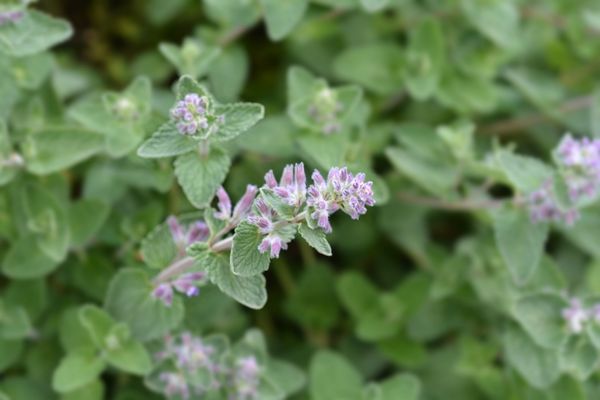
Lavender
This perennial herb, lavender, is a good choice for outdoor mosquito repellents, though you can use it in your home too, of course. Lavender has a scent that works against many mosquitoes, but also other bugs like moths. The best part is that you don’t really have to go through the process of turning it into lavender oil in order for it to be an effective repellent. You can just rub the lavender leaves on your skin thoroughly and it will function as a decent mosquito repellent.

Eucalyptus
The same plant that koalas love so much can also work as an excellent insect repellent. There are many types of this plant out there, which actually helps as far as functioning in the way you want it to, or rather where you want it to.
Like many of the other house plants on this list, Eucalyptus makes the most effective mosquito repellent when used as an oil, like a homemade bug spray. The plant also has medicinal properties and can be used for soreness, stress relief, and even toothpaste. All in all, it may be an even better option than things like citronella grass or lemon balm.

Citronella Grass
This is a good choice for the outdoors. That said, you could plant it in a container, but it is much more effective in large quantities. It has natural anti-mosquitoes properties and doesn’t require a great deal of care or maintenance to maintain, though you should keep it away from frost and let it stay in full sun.
There are multiple types of this plant, however, but the most effective is Cymbopogon Nardus or Citronella Winterianus types. This grass masks carbon dioxide in the atmosphere, which is something mosquitoes use to locate viable prey. By confusing the senses of the mosquitoes, the grass doesn’t repel mosquitoes so much as force them to go elsewhere because the masking makes it harder for them to hunt.
Oil from this plant has anti-microbial and anti-fungal properties. It has a distinct smell, but most people find it pleasant.
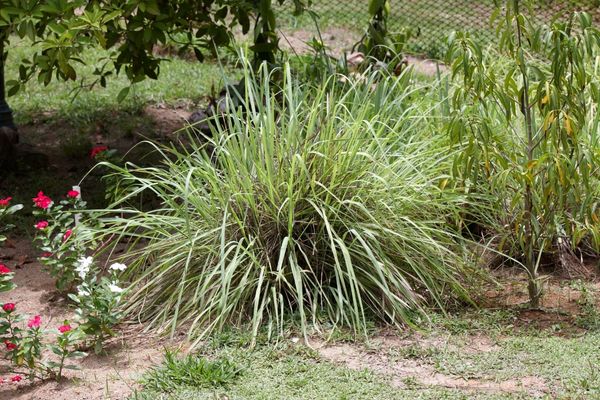
Geranium
This flower blooming is a natural insect repellent that has a lemon-like fragrance. It grows very quickly in full sun and dry climates. Scented geraniums can grow up to three feet tall, and it needs a lot of sunlight and good drainage.

Snowbrush
Snowbrush has a sticky, sweet balsam fragrance that does most of the work to deter mosquitoes, as they really don’t like that. But this white flower also keeps away a number of other pests with that fragrance, including rabbits and deer that may destroy a garden.
This quite hardy plant is an excellent garden backdrop, it is very sturdy when it grows in sunny and well-drained areas and you won’t have to replace them too terribly often.
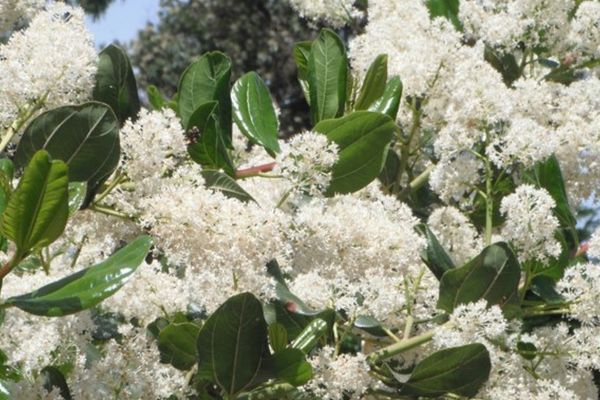
Mosquito Eating Plants
These fantastic plants actually attract mosquitoes, and different types of flies, like fruit flies and other bugs: for the purpose of eating them, of course. These plants include things like pitcher plants and Venus flytraps.
The mosquito plant cannot be grown in as large of quantities as most other flowers and shrubbery can. Or, if they can, most people probably don’t want an entire garden of Venus flytraps.
You can choose to plant these house plants in strategic locations, usually in spots that serve as entry points for the mosquitos and other insects you are trying to keep out, like a patio door or window that is sometimes open. By doing so, these plants are more likely to catch insects that are going to directly be a nuisance.
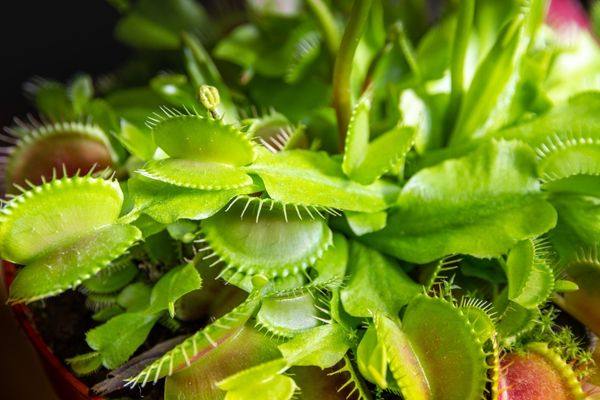
Conclusion
At the end of the day, there are many options available to you when choosing outdoor or indoor plants that can repel mosquitoes. Some need to be planted in large numbers, some can only be useful indoors, and some must have their essential oils extracted in order to be truly useful. The fact of the matter is, none of these choices is the objective best, as which one is best for your personal needs depends on many things, like the climate you live in, the amount of time you have to dedicate to growing and caring for them, and the aesthetics you wish to present around your home.
Still though, using this article as a guide can help you learn what initial options are available, as well as what you can expect in terms of performance and functionality, as well as which options may be able to serve an extra purpose or two in your home.
